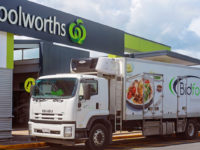
In Australia alone, we use about 1.72 million tonnes of printing and writing paper each year.
It’s a US$90 billion industry globally and one of the largest industrial sectors and polluters on the planet.
Sydney start-up Karst is disrupting the sector with eco friendly, waterproof, recyclable notebooks and journals made from mining and construction waste.
Founders Kevin Garcia and Jon Tse were visiting Taiwan in 2017 when they first came across stone paper which was used to package their food. It sparked the idea for their own business which in the space of just over two years has grown to sell over 60,000 notebooks in over 80 countries. Jon chatted to Inside FMCG about the Karst story.
Inside FMCG: Where does the name Karst come from?
Jon Tse: We launched Karst Stone Paper in July 2017. Geologists termed ‘karst’ when referring to a specific type of terrain resulting from the dissolution of stone. The name ‘Karst’ reflects both our products and our vision— to dissolve, rather, disrupt the paper industry. The need for paper isn’t going away anytime soon, but the need for a sustainable paper option is nearing a tipping point. Our products are born from a single intention, to respect people and the planet. We strive to follow this principle from beginning to end.
Inside FMCG: Can you explain a little about the process of making stone stationery?
JT: Without getting too scientific, the stone waste is collected from
licensed industrial, mining and construction quarries before being transported locally to our stone paper manufacturer. This recycled rubble is then ground down into a fine ‘stone powder’ which is then combined with a high quality, non-toxic resin, which acts as a glue and binds the particles together. Heat and pressure is then applied through a lot of rotations and
through heavy rollers until it is thin enough to be used as paper. We then cut and bind the paper into our notebooks, notepads and the world’s first stone paper sketchpads.

Inside FMCG: Is it more expensive or more difficult to produce than traditional paper?
JT: Once we have the paper, we then have the additional challenge of producing high-quality notebooks. This was a challenge on its own as the process is somewhat different from producing regular paper notebooks. The glues, binding, stitching, inks and printing all use different parameters that we had to overcome in order to produce products that were of the best quality and reflective of the Karst brand.
Our company is the most experienced in the industry when it comes to creating consumer products with stone paper. We have been working with the stone paper manufacturer, and the original stone paper creator and patent owner, to create unique Karst Stone Paper with a velvet-like, smooth feel to the end product due to the particular finishing we use on this. It is
more expensive to produce than traditional paper but we are growing quickly and benefiting from the economies of scale through reductions in costs.
Each metric tonne of Karst Stone Paper saves 950kg of carbon from entering the atmosphere, 18 large timber trees, 4720 kilowatts of energy, and 2770 liters of water, compared to the manufacture of regular paper, and importantly Our manufacturing process is powered in part by solar energy and uses a carbon footprint of 60% less than traditional paper, so the initial challenges we had to overcome to get here are well worth the efforts.
Inside FMCG: How does stone paper compare in terms of feel/writability?
JT: Writing on the paper is smooth because it lacks the grain directionality of normal paper. The stone paper is brighter than regular paper, and has a velvety smooth texture. It’s waterproof and tear-resistant so a normal ball point pens work just fine.
Inside FMCG: How has the support of large organisations like Facebook helped propel the brand?
JT: It has become a fantastic loop for us. We started off selling purely online to customers all over the world (we’ve got an amazing community of over 80,000 customers in over 84 countries). These customers have requested our products at their local bookstores, who in turn have become stockists. Furthermore, these same customers work in offices and workplaces around the world who are looking to become more eco-friendly and socially
conscious. This has resulted in some of the world’s leading organisations like Facebook, Chan Zuckerberg Initiative, TED, WeWork and Dermalogica to adopt Karst Stone Paper for employee induction packages, corporate gifting, events and so on. This in turn exposes Karst Stone Paper to more and more people which starts the cycle again. We are in a very unique, and seemingly niche, space that has these wonderful characteristics.

Inside FMCG: Are you planning to introduce the stationery line to Australian retailers?
JT: Karst Stone Paper is a purpose-driven business. We’ve built the company to create a more sustainable and productive world through thoughtfully designed products that inspire people and workplaces to live more consciously on a daily basis. We see ourselves in every school, in every meeting room and every workplace (whether our products and materials are branded or white label).
We are currently stocked in over 100 stores around the world, and will be in about 1000 by the same time next year. We are in a handful of Australian stores and have a warehouse in Sydney to ship our Australian customers. Most of the customers and stockists are in the US and Europe, so we also have a warehouse in LA and Amsterdam.
Inside FMCG: Have you plans to expand the range? Has it potential to be used as packaging?
JT: We started off with a single product, our flagship A5 hardcover notebooks and have since expanded to over 50 SKUs including notepads, softcover notebooks, sketchbooks in all different colours, covers and inner page variations. We have some exciting news for our flagship 2020 planner which we will keep you updated with.
Yes, we are currently looking at stone paper packaging which really ties into our mission. Although the paper we use is Cradle 2 Cradle Silver Certified (which is one of the most stringent globally recognized measures of safer and more sustainable products), the packaging used around the world although is recyclable, is still typically pulp paper (or recycled kraft paper). We’d love to be able to explore this more but it will take more time and resources.
We have also launched our Recycled and Reuse program whereby our customers can send their used Karst Stone Paper products back to us and we will ship them to our manufacturer where they will be returned into their original calcium carbonate form and ready to be used again.












